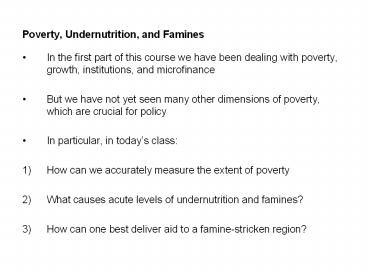Poverty, Undernutrition, and Famines - PowerPoint PPT Presentation
1 / 12
Title:
Poverty, Undernutrition, and Famines
Description:
3) Best way of delivering aid to a famine-stricken region (Coate 1989) ... Now suppose that the famine-stricken region is experiencing a surplus of food ... – PowerPoint PPT presentation
Number of Views:42
Avg rating:3.0/5.0
Title: Poverty, Undernutrition, and Famines
1
Poverty, Undernutrition, and Famines
- In the first part of this course we have been
dealing with poverty, growth, institutions, and
microfinance - But we have not yet seen many other dimensions of
poverty, which are crucial for policy - In particular, in todays class
- How can we accurately measure the extent of
poverty - What causes acute levels of undernutrition and
famines? - How can one best deliver aid to a famine-stricken
region?
2
1) Measuring Poverty
- Measuring poverty based on the notion of a
poverty line - Five concerns
- Expenditure or item-by-item consumption?
- Absolute or relative?
- Temporary or chronic?
- Households or individuals
- A fixed notion?
3
- Head count
- Head count ratio
- Poverty gap ratio
4
(c) Income gap ratio
Note All ignore relative depravation
5
2) Causes of poverty
- Lack of assets and undernutrition, obviously
interconnected - Energy input
- Nutrition and work capacity
- Discrimination against females, both adults and
children - Credit and Insurance
6
3) Famines and aid
- A. Sen argues that a distinction should be made
between starvation and famines, and - That starvation and famines are not due to FAD,
but distribution - Food entitlements depend on individuals assets
and the amount of food individuals can obtain via
exchange - Below a certain threshold, individuals unable to
acquire food against those assets, and can
therefore experience starvation and famines
7
3) Best way of delivering aid to a
famine-stricken region (Coate 1989) Note we
are dealing with aggregate shocks here
- First Who are the vulnerable?
- Three possible scenarios, easy to distinguish
the vulnerable - A rural region populated by large and small
scale subsistence farmers, and suppose that there
is a crop failure - A rural region populated by farmers and landless
laborers, and there is a bad harvest - A rural region populated by high and low wage
earners, and food prices increase
8
Suppose an scenario where famine- stricken region
is originally exporting food, importing food, or
neitherAnd suppose that an aid agency wishes to
minimize mortality rates
9
Now suppose that the famine-stricken region is
experiencing a surplus of food and is originally
exporting food. Are cash handouts a good strategy?
10
Now suppose that a famine-stricken region is
originally importing food. Are cash handouts a
good strategy?
11
Now suppose that a famine stricken region is
neither importing nor exporting food. Are cash
handouts a good strategy?
12
In Sens view Famines can be prevented via
- Employment creation
- Public holdings of food stock
- Health
- Education
- Clean water and sanitation
- DR adds
- Land reforms
- Human capital
- ? Next Class Population and Rural Urban
Migration (Consult syllabus)

